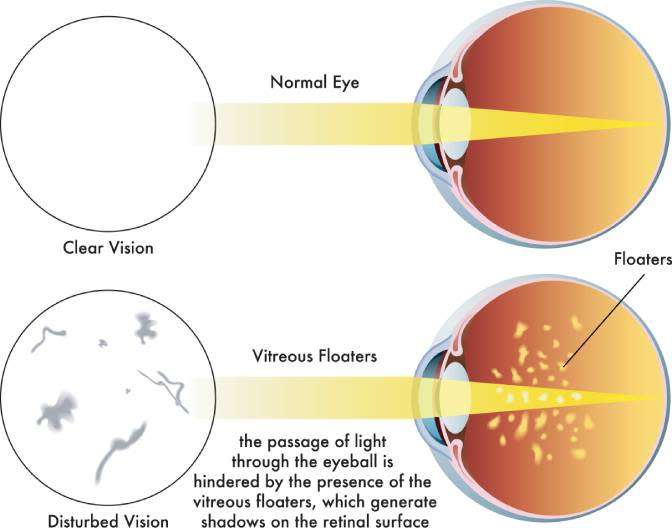Buy One, Get One 50% OFF Eyeglasses
* Restrictions apply. Ask a Team Member for details.
Eye Floaters Treatment

Eye Floater Treatment at The EyeDoctors Optometrists
Eye floaters don’t always require treatment but they can impair your vision and be a symptom of other underlying eye problems.
Eye floaters are spots in your vision that may drift about when you move your eyes and can dart away when you look at them directly. Eye floaters are usually caused by age-related changes in the eyes, and often disappear on their own in weeks or months. At The EyeDoctors Optometrists, our doctors specialize in diagnosing and treating eye floaters and restoring your peace of mind.

Find Eye Floater Treatment From The EyeDoctors Optometrists Near You
The EyeDoctors Optometrists can diagnose and treat eye floaters at our locations serving Kansas.
What Are Eye Floaters?
An eye floater is a transparent, small, curved object that you may see in your field of vision. An eye floater may take on the appearance of a cobweb, worm, circle, line, dot, spot, or speck and can be of various shapes and sizes. The spots are often caused by small flecks of protein or other matter that become trapped in your eye. An eye flasher is a momentary streak of light in your field of vision. Flashes may indicate more serious vision problems, including posterior vitreous detachment or a retinal tear.
Eye floaters are caused by a variety of factors:
Natural as we age
Inflammation in the back of the eye
Bleeding in the eye
Torn retina
Eye surgeries and medications
Floaters are common, especially as we age. If the issue persists, you should schedule an appointment with The EyeDoctors Optometrists.
Eye Floater Symptoms
Symptoms of eye floaters include seeing shapes in your vision that appear as specks, strings, or floating materials, spots that move when you move your eyes. Spots that are most noticeable are the ones when looking at a plain background. They appear as small shapes that settle down and drift out of your sightline.
Risk Factors for Eye Floaters
Eye floater risk factors include being over the age of 50, being nearsighted, having recently experienced eye trauma, having recently undergone cataract surgery or having inflamed eyes or diabetic retinopathy. If you have any of these risk factors, it is a good idea to visit your local The EyeDoctors Optometrists for an examination.

Eye Floater Treatment Options at The EyeDoctors Optometrists
After your examination for eye floaters, time may be the only prescription. This is because eye floaters are commonly just an effect of aging and may go away on their own. Surgery where a small incision is made to remove the vitreous material or laser therapy may be recommended if your eye floater impairs your vision. At The EyeDoctors Optometrists, we’ll work with you to develop a customized treatment plan.
Frequently Asked Questions About Eye Floaters
Anyone can develop eye floaters. Those with an increased risk of developing this condition are:
45 years of age or older
Nearsighted
Have previously undergone a cataract operation
Have had laser surgery
Time may be all one needs to get rid of an eye floater. In serious cases, there are other treatment options you may wish to explore. A vitrectomy is an invasive surgery that can remove floaters from your line of vision. During this procedure, the surgeon will remove the vitreous and replace it with another solution. Laser therapy is another option for getting rid of eye floaters. Laser therapy is an option that may break up the floaters present and make them less noticeable to your line of sight and vision.
By themselves, floaters will not make you go blind.
However, it’s important to remember that floaters can be a symptom of more serious vision conditions such as diabetic retinopathy or retinal detachment. If not diagnosed or treated properly, these eye conditions could lead to blindness.